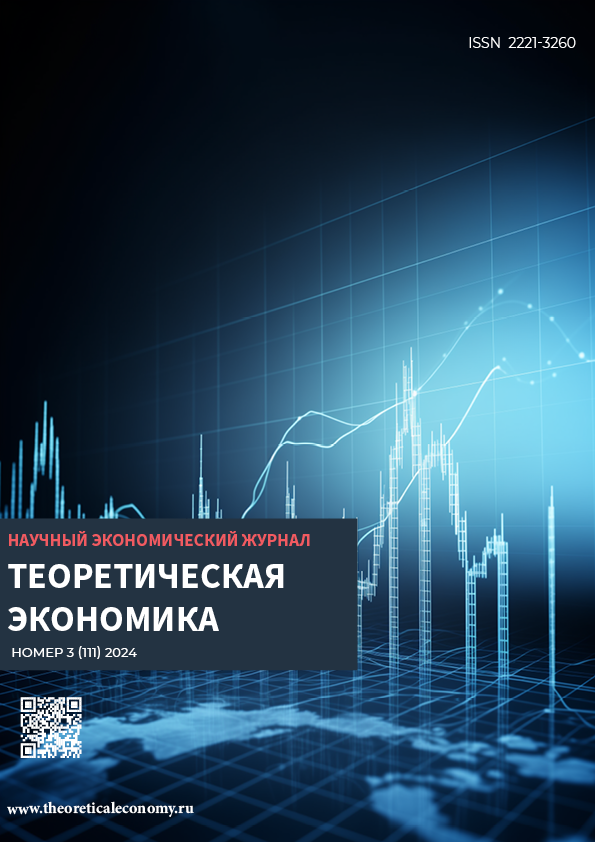Yaroslavl', Yaroslavl, Russian Federation
Yaroslavl, Yaroslavl, Russian Federation
The shocks of the twentieth century and the crisis phenomena of the early twenty-first require from political economists new approaches to the interpretation of the changes taking place in the current economy. The dynamism and contradictory nature of the market economy is based on competition, which is the source of formal and real subordination of labour to capital. The competition that was available in the 19th and 20th centuries has disappeared from the historical arena. It has been replaced by conflict, raiding and sanctions. During the comparison of economic theories, there is a discussion of methodology, which is the basis for the development of procedures and forecasts. Despite the fact that the history of economic thought and economic history cannot give contemporaries a clear model of the development of society in the 21st century, some clues are still present. The article traces changes in the content and forms of manifestation of the concepts of the highest rank of complexity (global competition, the legacy of K. Marx and Marxism, late capitalism, the history of political economy as a space of reflexion in the 21st century). Modifications of meaning in the evolution of concepts are taken into account: historical time, epoch, century trends, generational approach. The sources of information possessing novelty from the point of view of introducing new concepts relevant for the modern stage of society development into the scientific turnover have been introduced. Hypotheses (theses - assumptions) regarding the development trajectory of Russia and the world in the current decade are put forward for discussion. Each section of the article is autonomous and has a non-trivial value.
confrontational competition, K. Marx, economic philosophy, economic history, paradigm, trends in geoeconomics and geopolitics.
1. Al'tyusser L. Oshibki klassicheskoy politekonomii: nabroski ponyatiya istoricheskogo vremeni // Neprikosnovennyy zapas. 2022. Nomer 2. s. 12-45.
2. Anan'in O.I. Kak voznikla ekonomicheskaya nauka: konkurs proektov // Voprosy ekonomiki. 2023. № 3. S.5-23.
3. Burd'e P. P'er Burd'e: Ekonomicheskaya antropologiya. Kurs lekciy v Kollezh de Frans (1992-1993) / per. s fr. D. Kralechkin. Moskva : Delo, 2019.
4. Konina N.Yu. Osobennosti rynochnogo polozheniya evropeyskih TNK v sovremennyh usloviyah // Sovr. Evropa. 2022. № 4. s. 78-91.
5. Korshunov V.O. Nekotorye aspekty razvitiya evropeyskoy oboronnoy promyshlennosti // ME i MO. 2022. № 12. s.98-107.
6. Kuznecov N. Konkurentnyy podhod SShA k KNR strategiya aktivnogo perekladyvaniya bremeni // ME i MO. 2023. № 3. s. 90-101.
7. Gloveli G.D. Ekonomicheskaya istoriya: uchebnik dlya bakalavrov. Moskva : Yurayt, 2014.
8. Makasheva N.A. Marzhinalistskaya revolyuciya: sobytie, process, mif // Voprosy ekonomiki, 2022. № 11. s. 5-23.
9. Marks K. Grazhdanskaya voyna vo Francii. Moskva: Politizdat, 1984.
10. Novaya istoriya stran Evropy i SShA: 1815 - 1918. Moskva: Vysshaya shkola, 2005.
11. Peftiev V.I. Turbulentnoe desyatiletie Karla Marksa: Zametki na polyah yubileynoy konferencii // Social'no-politicheskie issledovaniya. 2019. № 2. S.102-110.
12. Peftiev V.I. Konstituciya Francii 1875g: prichiny ustoychivosti // Voprosy otechestvennoy i zarubezhnoy istorii. Mat. konf. «Chtenie Ushinskogo». Yaroslavl': RIO YaGPU, 2020. ch.2. S.48-52.
13. Piketti T. Kapital v XXI veke. Moskva: Ad Marginem Press, 2016.
14. Pirenn A. Niderlandskaya revolyuciya // Per F.A. Kogan-Bernshteyn; red. i vest. st. E.A. Kosminskogo. Moskva: Gos. soc.-ek. izd., 1937.
15. Pirenn A. Srednevekovye goroda i vozrozhdenie torgovli. Nizhniy Novgorod, 2009.
16. Prigozhin B.I., Schedrina T.G. O dostoinstvah idei paradigmy // Voprosy filosofii. 2023. № 1. S.84-93.
17. Tomas K. Poluprovodnikovaya industriya: strategiya KNR i SShA // Ekonomist. 2023. № 2. S.49-54.
18. Eyhenbaum B. Lev Tolstoy. Kniga vtoraya. 60-e gody. Moskva: GIHL, 1931.
19. Labonlaye E. L'Etat et ses limites. Paris, 1871.
 This work is licensed under Creative Commons Attribution-NonCommercial-NoDerivatives 4.0 International
This work is licensed under Creative Commons Attribution-NonCommercial-NoDerivatives 4.0 International
















